Posted on December 22, 2016
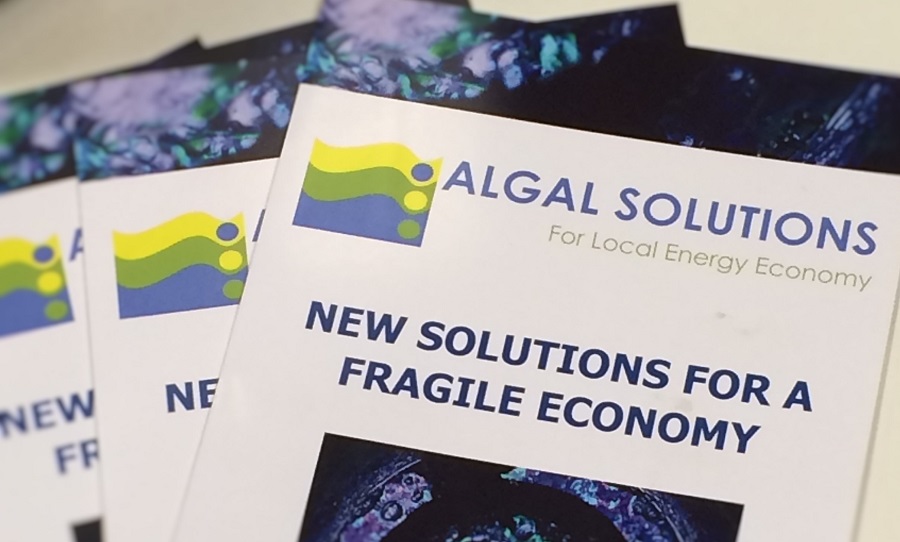
Joseph Rowntree Charitable Trust
ASLEE partner, ALIenergy is delighted to receive funding from the Joseph Rowntree Charitable Trust’s Sustainable Future Programme, to help spread the word about the ASLEE project as a radical and exciting new solution to electric grid constraints and economic viability issues for renewable energy projects – using a circular economic model to overcome intermittent energy supply issues and provide a grid balancing service, coupling electricity generation with an algal manufacturing process – whilst also creating a valuable product from local waste streams.
ALIenergy representatives Lynda Mitchell and Carole Shellcock traveled to London to meet with the charity trustees, who commented that they were particularly inspired by the potential this project has to address multiple issues.
The Joseph Rowntree Charitable Trust – Sustainable Future Programme aims to tackle anthropogenic climate change which is threatening the well-being of humanity. Technological change is essential but not sufficient; fundamental changes to economic models will also be required. Joseph Rowntree Charitable Trust is deeply concerned about climate change and its effects, and believes that our care for future generations morally compels us to play a part in tackling it.
If you would like to hear more about the ASLEE project, or would like to invite us to speak at your event or organisation, please get in touch.
For more information visit Joseph Rowntree Charitable Trust
Posted on December 20, 2016
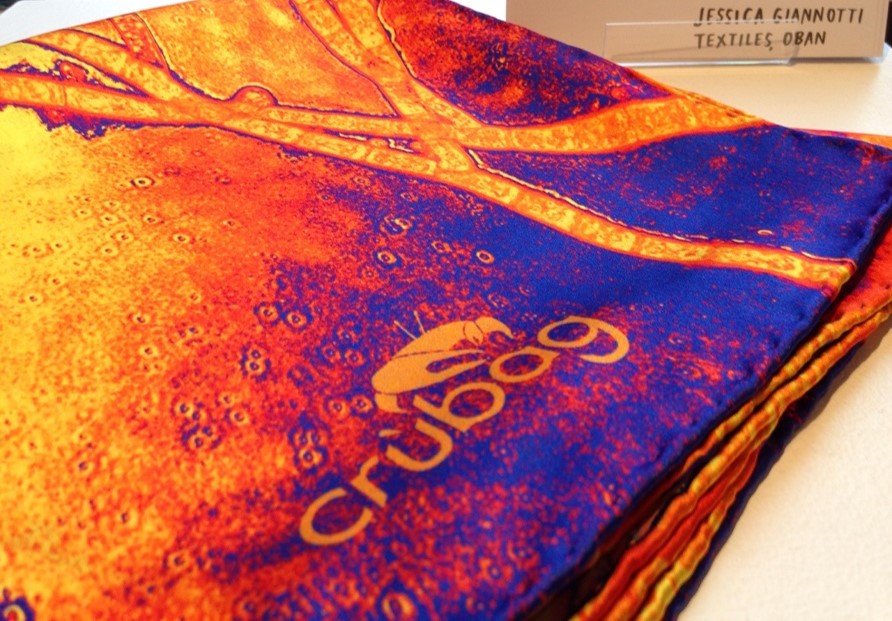
Crùbag….inspired by the beauty and hidden secrets of the ocean.
Crùbag believes marine science is beautiful. Using the evocative power of design, Crùbag makes luxury scarves and stunning textiles inspired by the beauty and hidden secrets of the marine environment. Each piece tells a story about the oceans, cutting-edge research and current environmental issues. It became our mission to portray these tiny windows of wonders that scientists open and share the passion and love we have for the sea. Our products are beautiful, tangible and made with love and craftsmanship. We use only natural fabrics and manufacture to very high environmental standards.
Crùbag’s founder and designer, Jessica Giannotti, uses her background in marine science to tell the stories and inspiration behind these beautiful designs. With a design studio at the Scottish Marine Institute, on the beautiful West Coast of Scotland, Crùbag draws constant inspiration from it’s setting. We also donate a portion of our sales to scientific institutions to support continued research in marine science.
The Gachon Collection 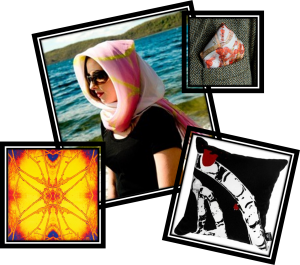
Crùbag’s first collection, the Gachon Collection, was inspired by research carried out by Dr Claire Gachon, from the Scottish Association for Marine Science. Claire is particularly interested in algae-pathogen interactions and the effects of pathogen infection on the ecosystem and in regulating biodiversity. Algae can suffer from parasites and diseases just like terrestrial plants, understanding the algae-pathogen relationship is an important area of research for ecosystem functioning and aquaculture production (supporting health, food, chemical and biofuel industries). The designs within the Gachon collection illustrate the beauty of the algae and the pathogens and show how the natural environment works. Early development stages of the collection were funded by Natural Environment Research Council allowing us to create a comprehensive science outreach package to go with our luxurious textiles. With the success of the Gachon collection, we experienced how giving people beautiful products that they can touch and wear inspires new conversations about science and brings awareness of complex ecological issues into daily life.
The Flo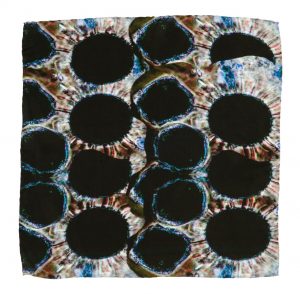 ra Collection
ra Collection
The Flora collection was inspired by research on harmful algal blooms and the development was kindly sponsored by the International Society for the Study of Harmful Algae. The objective was to spark interest in micro-algae, specifically harmful algal blooms (HABs), with the creation of beautiful and unusual textile items. Microscopic marine algae exhibit a wealth of shapes, colours and textures which lend themselves exceptionally well to textile design. HABs occur when the normally benign growth of algae becomes detrimental to humans or other organisms. This project focused on the five mechanisms in which a HAB can be detrimental, specifically: (1) damage to fish gills; (2) water discolouration; (3) anoxia; (4) slime or foam formation and (5) biotoxin production.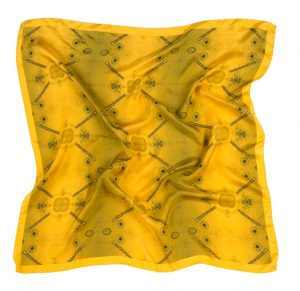
Crùbag’s abstract and artistic depictions of the research science connects people on a subjective and emotional level; whereas the science-outreach materials (printed and online) ignite excitement, curiosity and encourage a more cognitive and analytical response. These two aspects of our work combined with the tangible feel of the textiles and the three-dimensional form of the skillfully crafted accessories encourage an overall positive response similar to that evoked by charismatic species. People tend to attach and care about what they know. We bring marine research and scientists closer to peoples’ minds and hearts. The luxurious products make our customers feel unique and inspired. Crùbag has developed a new sense of luxury more attuned to our current Zeitgeist. Come and explore with us!
We are launching a new website with lots of content and a new online shop very soon. In the meantime feel free to get in touch – jessica@crubag.co.uk
Posted on December 19, 2016
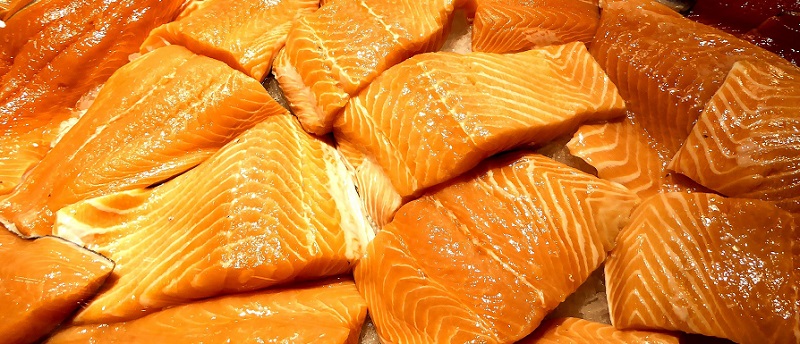
Is salmon on your Christmas menu?
Omega-3 fatty acids are polyunsaturated fatty acids (PUFAs) that are essential for health. The nutrients are required for a number of fundamental processes in the body such as controlling blood clotting and building cell membranes in the brain, and since our bodies cannot make omega-3 fatty acids, we must get them through our diet. Omega-3 fatty acids are also associated with many other health benefits, including protection against heart disease and possibly stroke, and reduction of inflammation.
Omega-3 fatty acids are found in oily fish such as salmon, mackerel and sardines. In the wild these fish obtain the omega-3 fatty acids from the marine algae on which they feed. Farmed fish are an excellent source of omega-3 fatty acids. In aquaculture the fish obtain the omega-3 fatty acids from the feed they are given, which contains fish meal and oils from smaller oily fish like anchovies. However, dwindling wild fish stocks are impacting the availability of fish oils and increasing the price. Consequently less fish oil is being added into the fish feed. A recent study from Stirling University indicated that the amount of omega-3 in farmed salmon has fallen by half in the last 5 years (http://www.bbc.co.uk/news/science-environment-37321656).
As the demand for farmed salmon and other fish increases globally, finding alternative sources of beneficial omega-3 fatty acids is essential and attention is increasingly focusing on micro-algae. In the oceans, micro-algae are the primary producers of omega-3 fatty acids, along with other beneficial unsaturated long-chain fatty acids. Cultivation of fatty acid producing micro-algae for incorporation into farmed fish feed could reduce the demand for fish oils and fish meal from wild pelagic fish stocks and enhance the algal manufacturing industry. Denmark-based aquaculture feed company, BioMar, have already begun production of fish feed which includes omega-3 oils from micro-algae whereby increasing sustainability in the aquaculture market. BioMar feed is used in production of one fifth of the farmed fish in Europe and South and Central America. (https://www.undercurrentnews.com/2016/05/26/biomar-launches-fish-feed-with-fatty-acids-obtained-from-omega-3-rich-microalgae/)
One area of focus of the ASLEE project is to examine the economic viability of using local renewable electricity for phototrophic cultivation of micro-algae, greatly reducing production costs. In a few years’ time your Christmas salmon might contain omega-3 fatty acids produced right here in Scotland.





 ra Collection
ra Collection
